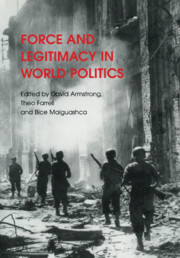Book contents
- Frontmatter
- Contents
- Notes on contributors
- Introduction
- 1 Legitimacy and the use of force: can the circle be squared?
- 2 Legality and legitimacy: the quest for principled flexibility and restraint
- 3 Not yet havoc: geopolitical change and the international rules on military force
- 4 Liberal hierarchy and the licence to use force
- 5 The age of liberal wars
- 6 Force, legitimacy, success and Iraq
- 7 War and international relations: a military historical perspective on force and legitimacy
- 8 The judgement of war: on the idea of legitimate force in world politics
- 9 Discourses of difference: civilians, combatants and compliance with the laws of wars
- 10 Fights about rules: the role of efficacy and power in changing multilateralism
- 11 Peacekeeping and enforcement action in Africa: the role of Europe and the obligations of multilateralism
- 12 Identity, legitimacy and the use of military force: Russia's Great Power identities and military intervention in Abkhazia
- 13 Dead or alive: American vengeance goes global
- Index
12 - Identity, legitimacy and the use of military force: Russia's Great Power identities and military intervention in Abkhazia
Published online by Cambridge University Press: 06 July 2010
- Frontmatter
- Contents
- Notes on contributors
- Introduction
- 1 Legitimacy and the use of force: can the circle be squared?
- 2 Legality and legitimacy: the quest for principled flexibility and restraint
- 3 Not yet havoc: geopolitical change and the international rules on military force
- 4 Liberal hierarchy and the licence to use force
- 5 The age of liberal wars
- 6 Force, legitimacy, success and Iraq
- 7 War and international relations: a military historical perspective on force and legitimacy
- 8 The judgement of war: on the idea of legitimate force in world politics
- 9 Discourses of difference: civilians, combatants and compliance with the laws of wars
- 10 Fights about rules: the role of efficacy and power in changing multilateralism
- 11 Peacekeeping and enforcement action in Africa: the role of Europe and the obligations of multilateralism
- 12 Identity, legitimacy and the use of military force: Russia's Great Power identities and military intervention in Abkhazia
- 13 Dead or alive: American vengeance goes global
- Index
Summary
An action is legitimate if the pertinent community deems it so. Most would agree that Russia's conduct in the 1990s in Georgia was illegitimate. Military intervention in another state, unless the other state is preparing an imminent attack on one's own territory, or is engaged in the systematic abuse of one's own citizens, is a violation of the international norm of sovereignty, at a minimum. Some have argued that European politics has gone beyond this ‘territorial integrity norm’ to something more expansive, to a consensual renunciation of any and all territorial claims on other states. This was first codified in the Helsinki Final Act of 1975.
The interesting question is whether Russia deemed its behaviour illegitimate. If it knew that it was violating international sovereignty norms, that would say a lot about Russia's lack of regard for normative constraints on its foreign policy conduct. It would also speak to the relative weakness of international norms to shape state behaviour. On the other hand, and perhaps more interesting, if Russia did not believe its behaviour illegitimate, but instead thought its use of military force in another country was within the bounds of international propriety, then the question is how is it possible for Russia to entertain such ideas?
The answer in this article is that different Russian identities yield different understandings of legitimacy. There is no one Russia. Instead, depending on which discursive construction of the Russian self is empowered by Russia's political system at a given time, a different Russia is acting in the world.
- Type
- Chapter
- Information
- Force and Legitimacy in World Politics , pp. 225 - 244Publisher: Cambridge University PressPrint publication year: 2006



